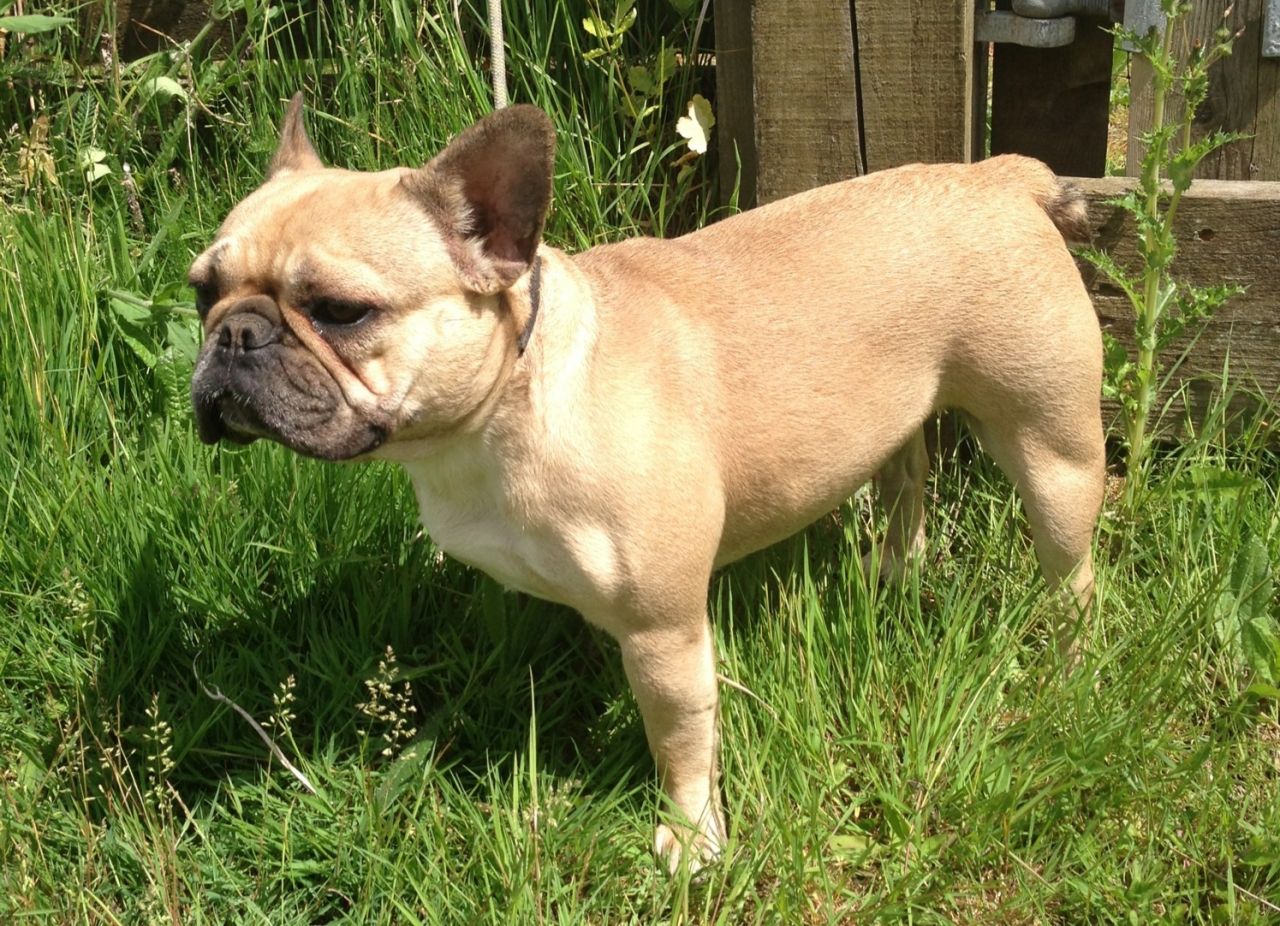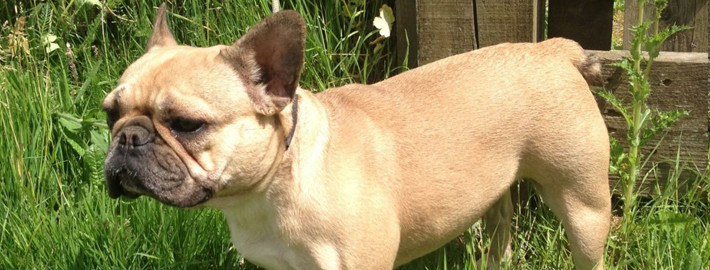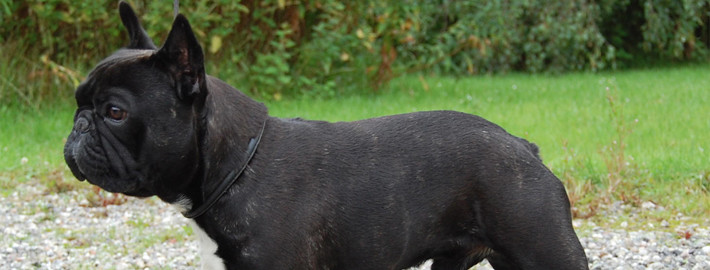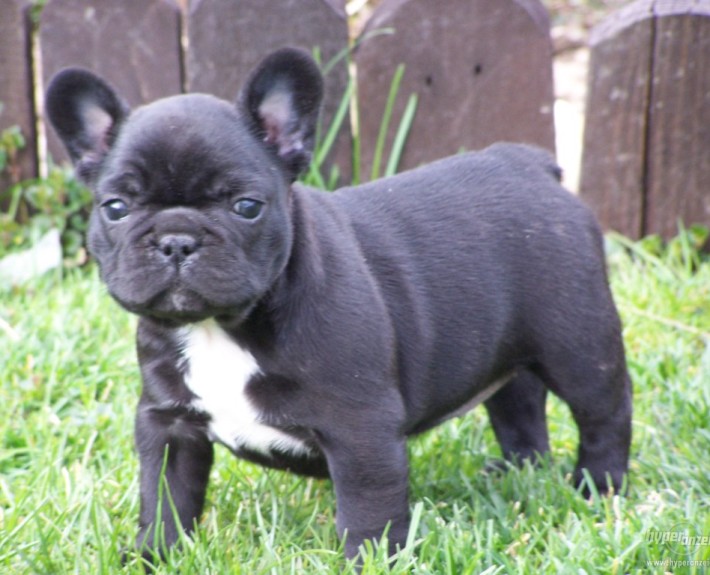What makes the French Bulldog Unique?
French Bulldogs are a breed whose bat ears, big eyes, and comical antics have made them popular companions throughout the world. Despite the country of origin that their name would imply, members of this breed are native to England.
Breed Groups
Page Contents

Is the French Bulldog Right For You?
French Bulldogs make decent watchdogs and they will bark if anyone shows up but they are not overly vocal as a general rule. Their small size and affable personality renders them poor guardians. In fact, these dogs get along very well with strangers, polite children, and most other animals. French Bulldogs have to live inside because they need air conditioning in order to breathe properly when the temperatures get too high for their liking. This fact alone shouldn’t put off prospective owners because these dogs also have limited exercise needs and don’t require large houses in order to be happy.
In 5 Words
- Intellegent
- Loyal
- Quiet
- Excellent
- Gentle
Characteristics
Learn About the French Bulldog
Description
General Description
Despite the fact that they are much smaller than English Bulldogs, French Bulldogs share many of the same traits that define their larger cousins. Both breeds have stocky bodies, muscular builds, dense bones, loose skin, and square heads. However, French Bulldogs possess inquisitive expressions in their large, dark eyes and upright, bat-like ears that set them apart from their relatives. These dogs also have wide muzzles, drooping upper lips, square jaws, and an under bite. A black nose is another common breed feature but this appendage may be a different hue in dogs with a lighter coat. French Bulldogs may likewise sport either a corkscrew tail or one that is straight, depending on the individual in question. These dogs are generally as long as they are tall and they typically move with a free flowing gait.
Size
Dogs of both genders stand between 11 and 13 inches (28 and 33 centimeters) in height. Members of this breed also weigh between 22 and 28 pounds (10 and 13 kilograms) on average. It is considered unacceptable for French Bulldogs that are being shown to weigh over 28 pounds (13 kilograms).
Coat
Members of this breed have short, glossy coats. French Bulldogs come in brindle, cream, white, fawn, and black in a variety of color combinations as well as solid hues. Grey and white dogs are likewise considered acceptable. Black masks, piebalds, spots, and white or brindle markings may also be seen on these dogs.
Short History of the French Bulldog
During the earliest portions of recorded history, Phoenician traders were responsible for spreading a specific variety of Greek dog throughout their networks. The modern Mastiff and Bulldog breeds are subsequently descended from these castaways. Although these and other so-called ‘fighters’ were initially quite popular in Britain, the animals were nonetheless forced to find a new occupation when dog fighting was outlawed in the 1830s.
Fortunately, Bulldogs had been breed for companionship since the early portion of the century. Efforts had also been made to reduce the breed’s large size by crossing the dogs with terriers and pugs in order to make them more appealing to prospective owners. In addition to these things, Bulldogs that were considered ‘flawed’ by regular English standards due their diminutive stature and/or their pointed ears eventually made their way across the channel to France, where they became very popular with women from all walks of society.
These dogs were officially recognized by the American Kennel Club (AKC) in 1898 and they are currently classed as a non sporting breed.
Temperament
Members of this breed possess friendly, outgoing natures and they are said to be quite comical. However, these dogs as happy to cuddle up on the couch with their favorite person as they are being the center of attention. French Bulldogs make decent watchdogs and they will bark if anyone shows up but they are not overly vocal as a general rule. Their small size and affable personality renders them poor guardians. In fact, these dogs get along very well with strangers, polite children, and most other animals. French Bulldogs have to live inside because they need air conditioning in order to breathe properly when the temperatures get too high for their liking. This fact alone shouldn’t put off prospective owners because these dogs also have limited exercise needs and don’t require large houses in order to be happy.
Caring for Your French Bulldog
General Health
These dogs have an average lifespan of 8 to 12 years, but they are not the healthiest of breeds. In fact, most puppies are delivered by cesarean section because their large heads might otherwise lead to them getting stuck in the birth canal. Even young dogs can show signs of breathing problems on hot days, particularly if they are allowed to spend too long in a place that isn’t air-conditioned. Heatstroke is a major health concern. However, these dogs are notoriously poor swimmers that typically sink like rocks when confronted with water. In such circumstances, owners should outfit their pet with a lifejacket in order to prevent accidents. Obesity is another serious concern for French Bulldogs and individuals that suffer from this condition are likely to have even more breathing difficulties. Eye ailments, joint diseases, spinal problems, and heart defects have also been known to occur in these dogs from time to time. As one can see, this is not a low maintenance breed as far as health issues are concerned.
Care
Daily
A couple of leisurely strolls around the block will provide all the exercise this breed needs. These dogs would also be up for a lively game of fetch in lieu of a walk. However, when the weather is warm outdoors, it is best to keep members of this breed inside during the hottest parts of the day because the dogs could easily overheat.
Weekly
Brushing your pet’s teeth a few times a week is a good way to help prevent cavities and otherwise promote good oral health.
Monthly
French Bulldogs will need flea, tick and heartworm prevention medication on a regular basis. Most products are administered once a month for optimal results.
Grooming & Bathing
Although some of these dogs are prone to drooling and slobbering, this is not generally the case in most members of this breed. French Bulldogs are usually tidy creatures that will go out of their way to avoid getting dirty. However, owners can certainly wash their dog once a month if they feel the need to do so but they will need to careful to keep water from getting in their pet’s nose during the process. It is also recommended that owners trim their pet’s toenails every month or two in order to prevent injuries from occurring.
Exercise & Training
French Bulldogs require a great deal of attention. After all, these dogs tend to take advantage of owners that are not as strong willed as they are. Members of this breed are also stubborn and have short attention span, both traits that make them difficult to train. In order for French Bulldogs to get the most out of their lessons, teaching sessions should be kept short and varied. Firm rules, consistent training, and patience will go a long way in helping these dogs learn what their owners want to teach them.
Lavish praise is another way to hold a French Bulldogs’ interest in the task at hand but it goes without saying that misbehaving pets should not be sweet talked under any circumstances, lest they get the wrong impression. Treats are another good motivator for members of this but they should be used sparingly because obesity is a serious health problem for these dogs. French Bulldogs can take an exceptionally long time to housetrain so prospective owners should keep that in mind when considering a member of this breed. Owners should likewise be aware that improperly trained French Bulldogs may become dog aggressive.











